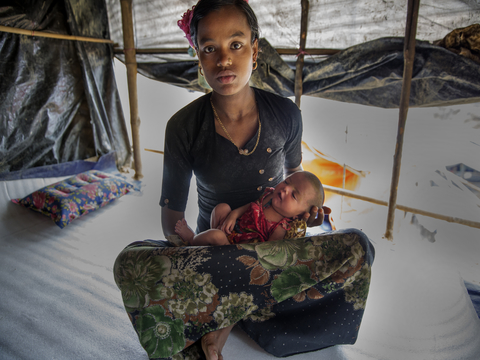The biggest joy in her life is her son. But Sara Ghorbani remembers the time when motherhood seemed like a distant dream.
Two years into her marriage, Sara’s husband Fouad lost his job at a time when the Iranian economy was suffering from severe stagnation, inflation, and unemployment. “At first, I was against having a child,” said the 35-year-old beautician, who lives with her husband in a two-bedroom apartment just outside the capital Tehran. “I kept saying, it’s hard. We weren’t sure if we could care for a child or provide the proper upbringing.” But the couple never gave up the dream of having a child and decided they would no longer wait for things to improve.
“In our hearts, we knew we wanted a child – a child who belongs to us. The thought never left our minds,” said Sara. “We decided if we want it, we can make it happen.” Five years ago, Sara and Fouad became proud parents to a baby boy named Caren. The couple says raising a child has been the biggest challenge of their lives, but they have never been happier.
“Sure, it’s hard, but it becomes habit,” said Sara. “It’s like God gives us the energy and stamina. When I look at Caren and how he’s growing, I really enjoy it,” said Fouad. “I wanted a child before I got too old. That’s why I’ve never regretted this.”
Sara and Fouad are happy with their decision to have a child, but the Iranian government would be happier if they had more. That’s because for the past three decades Iran’s married couples have had fewer babies and analysts say the trend is threatening the country’s economy and cultural stability.
“It makes us very concerned,” said Doctor Ali Reza Marandi, a professor of pediatrics and Iran’s former Health Minister. “Low fertility rates can cause severe damage to a country’s future.” During the 1980s, Iran faced a much different problem. Population experts say married couple were having too many children.
It was Marandi who led a successful campaign to curb Iran’s growing fertility rate which stood at nearly seven babies per woman – the country’s highest level ever recorded.
Under the government-funded family planning campaign designed to counter the 1980s baby boom, family size in Iran dropped from nearly seven children to less than two by 2003. It was the largest drop in fertility rate ever recorded.
Today Iran’s total fertility rate is 2.01 births per woman- the lowest among Islamic countries, and slightly less than the target of 2.1. Some population experts say a fertility rate of 2.1 is required to keep the population stable – neither rising or falling.
Marandi says the future health of Iran’s economy depends in large part on married couples having more children, otherwise there may not be enough young workers to drive the economy, and health workers to care for the elderly.
“If this trend continues, it will be tremendously expensive for the economy to sustain,” said Marandi. “Those who produce in an economy are the young people. If the young continue to decrease and the elderly continue to increase, we may reach a point, in just a few years, when we will not be able to feed and care for the elderly.”
In 2014, the Iranian government launched an advertising campaign urging young couples to have more babies. Outdoor billboards posted throughout Tehran read, ‘More children, happier life.’ Iran’s Supreme Leader called on Iranians to have “four or five children” to contribute to the development of the country.
Since the campaign, Iran’s total fertility rate has increased slightly, but analysts and government officials say they still face challenges.
Many young Iranian women are postponing plans to marry to get an education instead. An increasing number of men say they can’t afford to get married and are waiting for the economy to improve. Many Iranians who do marry choose to pursue careers instead of having children.
Sara and Fouad both work full-time jobs to provide for their son and they still worry about the future of Iran’s economy, but they say they are proof that, even when circumstances are not ideal, you can get married, have children, and live a happy life. “I think whenever you want something, you can make it happen. The important thing is you have to want it,” said. Sara.
“The fact that we have a child who comes from me, this is a wonderful thing. It takes away the entire day’s troubles.”










